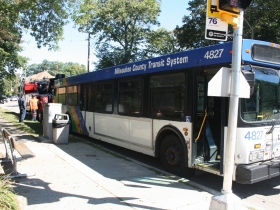BBC Deplores Wisconsin’s Black Imprisonment Rate
News show focuses international attention on problems here.
The state of Wisconsin imprisons a higher proportion of black men than any other state. Almost 13 percent of the state’s African American men are behind bars — nearly twice the national average. In Milwaukee County, according to a recent report from the University of Wisconsin-Milwaukee Employment & Training Institute [PDF], more than half of black men in their thirties have served time in state prison.
UW-Milwaukee’s John Pawasarat and Lois Quinn recently explored this problem as an aspect of the major workforce challenges facing the state. One of their key findings was that for black working-age men in the Milwaukee area, transportation barriers are a major obstacle to employment, restricting their prospects.
Among African Americans living in Milwaukee, 47 percent do not have a driver’s license, and the unemployment rate is 24 percent.
“Two-thirds of the county’s incarcerated African American men came from six zip codes in the poorest neighborhoods of Milwaukee,” Pawasarat and Quinn write. “Most ex-offenders return from prison into inner city neighborhoods that have extremely large gaps (i.e., 25 to 1 in May 2009) between the number of active job seekers compared to available full-time work.”
“When we do job surveys, we find that three-fourths of the jobs that are available are outside the bus lines,” she said.
Buses and rail have fared poorly under Scott Walker, who saw Milwaukee transit service deteriorate on his watch as county executive and managed to kill passenger rail service to Madison before even taking office as governor in 2010. Since then, Walker has presided over a 10 percent cut to the state’s transit budget. Milwaukee has been able to avoid dramatic bus service cuts so far, thanks to one-off budget maneuvers, but a $7 million deficit looms in 2014 [PDF]. One estimate from Joel Rast at UW-Milwaukee’s Center for Economic Development warned that Milwaukee bus cuts prompted by Walker’s decision to slash transit funding would eliminate access to more than 13,000 jobs for city residents.
For many, driving to work is not a viable option. Pawasarat and Quinn’s research shows that only about 10 percent of black men with incarceration records in the state had a current, valid drivers license with no recent suspensions or revocations.
“If there was a job here where I could get on the bus to support my family, I would take it,” Brian Osei, a participant in a jobs program for ex-offenders, told the BBC. “There’s nothing here. I have to take this risk [driving under suspension] to drive.”
This story originally ran on Streetsblog. Angie Schmitt is a newspaper reporter-turned planner/advocate who manages the Streetsblog Network from glamorous Cleveland, Ohio. She also writes about urban issues particular to the industrial Midwest at Rustwire.com.
Streetsblog
-
Car Culture Cements Suburban Politics
![Sprawl. Photo by David Shankbone (David Shankbone) [GFDL (http://www.gnu.org/copyleft/fdl.html) or CC-BY-SA-3.0 (http://creativecommons.org/licenses/by-sa/3.0/)], via Wikimedia Commons [ https://commons.wikimedia.org/wiki/File%3ASuburbia_by_David_Shankbone.jpg ]](https://urbanmilwaukee.com/wp-content/uploads/2017/10/1024px-Suburbia_by_David_Shankbone-185x122.jpg) Nov 23rd, 2018 by Angie Schmitt
Nov 23rd, 2018 by Angie Schmitt
-
Most Drivers Don’t Yield to Pedestrians
 Mar 22nd, 2018 by Angie Schmitt
Mar 22nd, 2018 by Angie Schmitt
-
Jobs Up Yet Driving Down in Seattle
 Feb 22nd, 2018 by Angie Schmitt
Feb 22nd, 2018 by Angie Schmitt






















For profit prisons and suburban racsim and cannibal capitalism, a trinity of coruption.
No doubt there is racism in the Milwaukee suburbs and parts of the city that resemble them, such as the area on S 27th near Grange Ave where I used to live, but I think the major thrust of the article is correct in that the lack of transit options available in metro Milwaukee to young black men is quite possibly or even likely a factor in the disproportionately high imprisonment rate of that demographic compared to other metro areas or states. I think, however, that the column also (probably deliberately) misstates the obvious in not once referencing “crime(s)” or “crime rate,” as my guess is that the rate of imprisonment of individuals in this group is very likely proportional to the number of crimes committed by people in that group.
If there is to be any hope of actually making real progress on this issue, I think we’re going to have to do better than the current state of affairs, which is liberals and conservatives operating mostly at cross-purposes to each other, with little substantive being accomplished. A typical conservative probably wouldn’t even bother reading the column, given the title, because his initial thought is that it very likely mostly consists of bleeding heart liberalist notions about the high rate of imprisonment of young black males being directly attributable to white racism, and that the criminal justice system itself is racist and rigged against people in that group.
If you really wanted to get conservative attention on this issue, consider subsituting “crime” and “crime rate” instead of these constant references to imprisonment and incarceration. Conservatives are much more interested in reducing the crime rate itself than worrying about the fate of people who have already committed crimes — most would tend to judge those individuals who have committed serious crimes as frankly deserving to go to jail, and I don’t think there is any power in the universe that can be conjured up now or in the future that is likely to change their minds. Let’s try and be a little more honest and direct about the root causes of these problems, and maybe there is some chance of actually improving things.